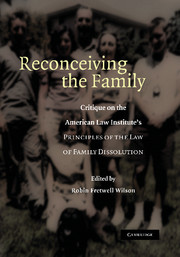 Reconceiving the Family
Reconceiving the Family Book contents
- Frontmatter
- Contents
- Acknowledgments
- Foreword, by Mary Ann Glendon
- List of Contributors
- Introduction
- PART ONE FAULT
- PART TWO CUSTODY
- PART THREE CHILD SUPPORT
- PART FOUR PROPERTY DIVISION
- PART FIVE SPOUSAL SUPPORT
- PART SIX DOMESTIC PARTNERSHIP
- 14 Domestic Partnership and Default Rules
- 15 Private Ordering under the ALI PRINCIPLES: As Natural as Status
- 16 Marriage Matters: What's Wrong with the ALI's Domestic Partnership Proposal
- 17 Domestic Partnerships, Implied Contracts, and Law Reform
- PART SEVEN AGREEMENTS
- PART EIGHT JUDICIAL AND LEGISLATIVE PERSPECTIVES
- PART NINE INTERNATIONAL REFLECTIONS
- Afterword: Elite Principles: The ALI Proposals and the Politics of Law Reform, by Carl E. Schneider
- Index
16 - Marriage Matters: What's Wrong with the ALI's Domestic Partnership Proposal
Published online by Cambridge University Press: 25 January 2010
- Frontmatter
- Contents
- Acknowledgments
- Foreword, by Mary Ann Glendon
- List of Contributors
- Introduction
- PART ONE FAULT
- PART TWO CUSTODY
- PART THREE CHILD SUPPORT
- PART FOUR PROPERTY DIVISION
- PART FIVE SPOUSAL SUPPORT
- PART SIX DOMESTIC PARTNERSHIP
- 14 Domestic Partnership and Default Rules
- 15 Private Ordering under the ALI PRINCIPLES: As Natural as Status
- 16 Marriage Matters: What's Wrong with the ALI's Domestic Partnership Proposal
- 17 Domestic Partnerships, Implied Contracts, and Law Reform
- PART SEVEN AGREEMENTS
- PART EIGHT JUDICIAL AND LEGISLATIVE PERSPECTIVES
- PART NINE INTERNATIONAL REFLECTIONS
- Afterword: Elite Principles: The ALI Proposals and the Politics of Law Reform, by Carl E. Schneider
- Index
Summary
Twenty-five years ago, the Marvin decision and its progeny stood the law of nonmarital cohabitation on its head. The law's prior inhibitory approach, which disallowed even explicit agreements between cohabitants, gave way to a contractual model that permits the parties both to enforce their understandings and to rely on an extensive battery of quasicontractual remedies. The ALI's new “domestic partnership” proposal would again stand the law of nonmarital cohabitation on its head: based on a domestic partnership finding, it would impose on the cohabiting couple who have chosen to avoid marriage obligations virtually identical to those the couple would have incurred had they elected to marry. The net effect of the ALI proposal would be to partially assimilate cohabitation to marriage.
The ALI proposal is not novel. Although its approach is rare in the United States, several other nations have adopted rules that impose on cohabitants some or all of the legal obligations assumed by marriage partners, and other nations are considering such innovations.
The ALI proposal is undesirable. In this chapter, I argue that the ALI has failed to make a convincing argument in favor of the conscriptive approach it advocates. My conclusion is grounded in a large body of evidence establishing that cohabitation is simply not, as the ALI argues, the functional or expressive equivalent of marriage. Because marriage and cohabitation have different social meanings and rest on different personal understandings, the ALI proposal would undermine the consistency, fairness, and integrity of family law.
- Type
- Chapter
- Information
- Reconceiving the FamilyCritique on the American Law Institute's Principles of the Law of Family Dissolution, pp. 305 - 330Publisher: Cambridge University PressPrint publication year: 2006


